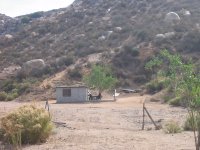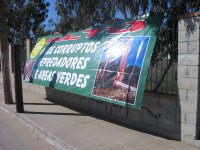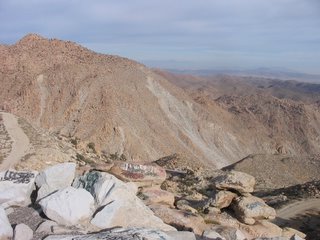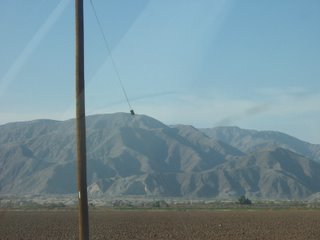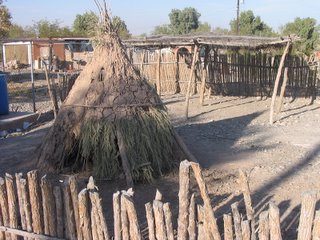
One of the good things about living in Mexico (and almost all the world outside the United States) is to be in a country with normal relations with Cuba. Besides the ability to purchase Cuban cigars and rum and see and hear Cuban entertainers, there is here a relatively sane approach to news from Cuba, or at least a variety of viewpoints.
Often there are interesting conferences held here simply because there are Cuban participants and they could not attend were the conference held in the USA. The photo is of a US, Mexico, Venezuela, Cuba labor conference held this winter in Tijuana. (I know it is a bad photo. The room was dark, conditions difficult.)
Recently a Cuba/USA conference of US oil businessmen & Cuban officials had to move from a US owned Sheraton hotel in Mexico City because the US thinks its laws (Cuban blockade) supercede Mexican laws (anti-discrimination in accomodations) even on Mexican soil. The story has been covered in a minor way in the US. In Mexico it has been a full blown scandle. Here is the Cuban perspective (in Granma's translation, not always smooth):
GRANMA EDITORIAL
February 10, 2006
A veritably lamentable event
WHAT has taken place in Mexico on account of orders from Washington to a hotel located in Mexico City provokes various sentiments, which range from indignation to pity. The facts are well known: a group of Cuban officials linked to the energy sector were meeting in Mexico with their U.S. colleagues for a professional and serious discussion, among other subjects, on the possibilities of cooperation in the oil prospecting sphere, something that has been happening for some years with diverse productive sectors of the United States interested in future exchanges with our country. This meeting had been agreed to by virtue of the express interest of the U.S. side to learn of the potential of Cuba's exclusive zone in the Gulf of Mexico, and the disposition of the Cuban government not to exclude the participation of U.S. companies in future negotiations on the theme. The meeting itself is yet further proof of the climate of mutual respect prevailing between our country and U.S. economic sectors, also evidenced in significant and increasing food purchases already standing at $500 million per year, which Cuba has paid for in cash and promptly, something which the current administration of the United States wishes to prevent at all costs at this time.
This event, as on other occasions, was taking place in Mexico, in a Mexican hotel, given that, by virtue of the blockade, both sides, Cuban and American, are prohibited by the Bush government from traveling to each other's country. It is well-known that the nationality of a subsidiary company, as in the case of the Maria Isabel Sheraton Hotel, is that of the country in which it is located, and independent of the nationality of the parent company. In other words, an entity registered in Mexico, under the shelter of Mexican legislation, it is in all legal effects a Mexican entity and should be ruled by the laws of Mexico and not those of the country who owns its assets or of its transnational owners. In addition to being legally unobjectionable, this has a profound practical content; above all in the present context of a globalized world, where innumerable foreign shareholders can possess companies in any country. Taking the example of Mexico itself, a country that receives a large amount of direct foreign investment, it is fitting to ask what would happen if every country began to apply its own laws to subsidiaries operating in Mexico. It is obvious that in those conditions German laws would be applied on some companies, French on others, Japanese on others, or perhaps all of them. One does not need to make much of an imaginative effort to deduce that this would lead to absolute chaos in the receptor country, in this case Mexico, as it would have to apply the laws of 10, 20 or more countries with distinct juridical regimes and corporative cultures. All this is clearly established so that it can be understood with absolute clarity and nobody would violate it, except the government of Bush who, as master of the world has demonstrated that he does not recognize any limit to his arrogant power.
The facts confirm it: last Friday when the first day of both delegations' working sessions had ended, the Cuban party was informed by the Mexican hotel administration that the U.S. State Department had instructed it to evict them from the premises. One supposes that the hotel manager thought that what had happened was very logical and reasonable. He didn't even blink, and immediately fulfilled the order he was given. He didn't stop to think for a second whether a foreign government had the legal capacity to give that order, or that any problem that might arise in this respect would have to be resolved under the precepts of Mexican law. The hotel manager cannot be blamed. He simply acted with the logic of someone who feels that he is not doing anything abnormal. That such an order was shameless and abusive in the eyes of the Mexican people and the world, would never have passed through his mind. Perhaps he even thought that evicting the Cuban officials from the hotel might please the government that vehemently condemns Cuba every year in the Geneva, and is unexpectedly silent in the face of the horrendous torture that the United States is daily committing against defenseless prisoners under its custody in Cuban territory illegally and forcefully occupied by the government that accuses it of violating human rights.
To make the act even more humiliating, the empire didn't even botherto inform the Mexican authorities, and the order was transmitted by a duty bureaucrat in the Treasury Department. Without any doubt, a country's sovereignty is immaterial and was not worth disturbing a higher official for. Brookly McLaughlin, the Treasury Department spokesperson could not have been more explicit in that respect. In a report published in The New York Times on February 7 she was quoted as having said that the Mexico City hotel is a U.S. subsidiary and thus is prohibited from offering services to Cuba or Cuban nationals. In this case we are simply following our usual procedures, by applying the law. She failed to explain, probably not thinking it necessary, that she was referring to the law of the United States.
According to a cable published in the Estrella Digital on February 9, another spokesperson in the State Department, Sean McCormack, stated that U.S. law is basically applied to U.S. companies or subsidiaries of U.S. groups wherever they might happen to be. It would be hard to find a clearer example of scorn for other countries' sovereignty.
The indignation of the Mexican people and within many of its institutions was not long in coming. Demonstrations were organized to protest at the gross offense. Senators from the main political parties reacted with honor and decorum. The Tuesday, February 7 edition of La Jornada newspaper published an article offering information on the issue titled: The extraterritorial application of U.S. law is inadmissible, Senators. The article began by saying: Senators from the PAN, PRI and PRD parties yesterday demanded the government of Vicente Fox to make an energetic diplomatic reaction to the expulsion of Cuban officials from the Maria Isabel Sheraton Hotel, on account of this act constituting a violation of Articles 1, 14 and 16 of the Constitution, in addition to what they described as the "shame" of allowing the application of extraterritorial laws in Mexico. That is inadmissible and requires immediate clarification, they stressed.
But in the midst of all this climate of unanimous condemnation of the ruling received from the North by the homeland of Juarez, what did the Mexican government say and do? If one analyzes the statement made by Foreign Minister Derbez, whom the international press has approached to know the Mexican government position on such a flagrant scandal, one would have to feel a strange mixture of perplexity and almost pity. In his first statement from Europe, where he was touring various countries, he acknowledged, according to an AFP cable on February 7, that the law could not in any way be applied extraterritorially, but hastened to add: "What we should do, not with the government of the United States because they have their own legislation, is to apply the corresponding sanction." Translated into direct and clear language what he is admitting with the most incredible indolence is that the U.S. Treasury Department can give orders to enterprises constituted and operating in Mexico; and given the case that the theme has come out in public and there was no other remedy than to take some kind of action to calm people, he blamed the enterprise that obeyed the order against the honor and dignity of Mexico. According to the same cable in New York, Ellen Gallo, a spokespersonfor the hotel chain, contradicted Mr. Derbez' point of view by correctly affirming that it was an issue between two governments.
Another headline from Mexico's La Jornada on February 8 published another unheard-of phrase from the Mexican foreign secretary: "The Sheraton will be sanctioned without any complaint being sent to Washington," and the newspaper added: "Luis Derbez Bautista, who is in London on the last leg of his two-week tour of Europe, said that the decision of the Maria Isabel Sheraton Hotel to evict a delegation of Cuban officials from its premises did not represent a violation of national sovereignty."
In the midst of growing internal indignation, the Mexican government was obliged to adopt a more energetic stand at such an affront to a nation educated in the example of the child heroes of Chapultepec and that of all those who have fought to preserve the highest values of the glorious Mexican people. Foreign Secretary Derbez was evidently insecure and indecisive. The Mexican El Universal confirmed his tribulations in an article datelined February 8, titled "Foreign Relations Secretary adjusts his position toward the United States on account of Cuban evictions." The same newspaper noted: "The Mexican government is discussing sending a diplomatic note of protest to the United States for the expulsion ofa Cuban delegation from the Maria Isabel Sheraton Hotel, stated Luis Ernest Derbez, who warned that the federal government would not allow any foreign law to have application over national ones." In a radio interview, the foreign secretary said that via Jeronimo Gutierrez, under-secretary for North America, the Mexican government has contacted the U.S. government to investigate the incident concretely and precisely. "(the under-secretary) will bring us the information so we can decide whether or not to bring a complaint against the U.S. government." However, in less than four hours, Derbez changed his position, because in a press conference in London before the radio interview he had assured that the incident did not merit sending a diplomatic note to Washington, as it was the Maria Isabel Sheraton Hotel that proceeded in undue manner, given that the Treasury Department only gave indications. Moreover, he assured that the United States did not violate Mexican sovereignty by asking the enterprise to apply a US law.
A more recent headline, La Jornada on February 9, offered new and even stranger statements: "Verbal petition to the United States to review the extraterritorial application of laws: Derbez." It is curious to confirm that even a timid "verbal petition" that theUnited States should review the application of its laws in Mexico was accompanied by an explanation that made it clear that the only guilty party for everything that took place was the hotel, and to demonstrate special pleasure with the Bush government by confirming that "relations with the United States are very positive in general terms." Further on, Foreign Secretary Derbez blamed the press for "making a scandal out of this matter." And he added, as if to ensure that there was no doubt of the extreme delicacy with which he made his "verbal petition" to Washington: "we have let the State Department know in a verbal manner that it would seem to us that they should review this territoriality (of their laws)."
Really, if anything was missing in these statements, it should have been to apologize for the terrible trouble caused to the StateDepartment to have to devote a few minutes of its extremely busy time to listen to someone to whom "it would seem" that the non-application of U.S. laws in his own country "should" be reviewed.
Subsequently, there was talk of closing down the hotel, but it should be clarified that the reasons adduced to threaten taking this measure are of a merely administrative nature, as if, for example, the hotel occupied 3,000 square meters of terrain without authorization, or was operating two bars without a license or not have an emergency exit installed.
As can be appreciated none of these reasons have the remotest connection with the essential problem: the fact that the spokespersons of the expansionist state who yesterday seized more than half of its territory from Mexico, are stating that Mexican enterprises with the participation of U.S. entities have to comply with U.S. laws in Mexico and have acted in a draconian manner in line with this self-assigned prerogative.
Evaluations of this event could be very varied, but as Marti said: "There are a series of essential truths that fit on the wing of a hummingbird and are, nevertheless, the key to public peace, spiritual elevation and the grandeur of the homeland."From our Marti point of view, we feel tremendous sadness for everything that has happened, which expresses up to what point the United States has afforded itself the right to ignore the Mexican government and people and to act in an impugn manner with total disrespect for the grandeur of that beautiful nation of close friends.
 Gathering the batons
Gathering the batons

